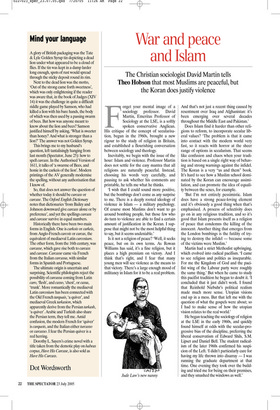Mind your language
A glory of British packaging was the Tate & Lyle Golden Syrup tin depicting a dead lion under what appeared to be a cloud of flies. If the tin was kept in a damp larder long enough, spots of rust would spread through the sticky deposit round its rim.
Next to the dead lion was the motto, ‘Out of the strong came forth sweetness’, which was only enlightening if the reader was aware that, in the book of Judges (XIV 14) it was the challenge in quite a difficult riddle game played by Samson, who had killed a lion with his bare hands, the body of which was then used by a passing swarm of bees. But how was anyone meant to know about the lion and bees? Samson justified himself by asking, ‘What is sweeter than honey? And what is stronger than a lion?’ The answer was not Golden Syrup.
This brings me to my husband’s question, left tantalisingly hanging from last month (Spectator, June 25): how to spell carcass. In the Authorised Version of 1611, it talks of ‘a swarme of Bees, and honie in the carkeis of the lion’. Modern printings of the AV generally modernise the spelling, without any authorisation that I know of.
So, that does not answer the question of whether today it should be carcass or carcase. The Oxford English Dictionary notes that dictionaries ‘from Bailey and Johnson downward give carcass alone or by preference’, and yet the spellings carcass and carcase survive in equal numbers.
Historically there have been two main forms in English. One is carkois or carkeis, from Anglo-French carcois or carcas, the equivalent of mediaeval Latin carcosium. The other form, from the 16th century, was carcasse, which gave rise both to carcass and carcase. Carcasse came via French from the Italian carcassa, with similar forms in Spanish and Portuguese.
The ultimate origin is uncertain and surprising. Scientific philologists reject the possibility of carcassa coming from Latin caro, ‘flesh’, and casso, ‘chest’, or cassa, ‘trunk’. More romantically the mediaeval Latin carcosium has been connected with the Old French tarquais, ‘a quiver’, and mediaeval Greek tarkasion, which apparently derive from the Persian tarkash, ‘a quiver’. Arabic and Turkish also share the Persian term, they tell me. Amid confusion, the modern French for ‘quiver’ is carquois, and the Italian either turcasso or carcasso. I fear the Persian quiver is a red herring.
Dorothy L. Sayers’s crime novel with a title taken from the demotic play on habeas corpus, Have His Carcase, is also sold as Have His Carcass.
Dot Wordsworth















































 Previous page
Previous page